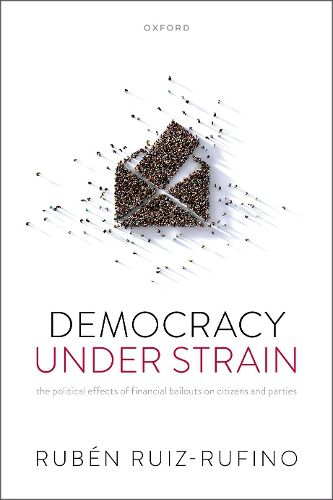Readings Newsletter
Become a Readings Member to make your shopping experience even easier.
Sign in or sign up for free!
You’re not far away from qualifying for FREE standard shipping within Australia
You’ve qualified for FREE standard shipping within Australia
The cart is loading…






How did the management of the 2009 financial crisis within the Economic Monetary Union impact the functioning of democracy? What are the political consequences of supranational responsibility trumping national preferences? This book answers these questions by examining the political consequences derived from the management of the Eurozone sovereign debt crisis and, in particular, how the decision to implement financial bailouts affected citizens and political parties.This book introduces the concept of 'democracy under strain'. This describes how countries integrated into a union such as the EMU lose control over their policy agenda in the presence of asymmetric economic shocks, which orients member states into two different groups: those facing deteriorating domestic economies and those concerned with financial contagion and the overall stability of the union. Employing various quantitative methods, Ruben Ruiz-Rufino shows how the implementation of financial bailouts in the wake of the 2009 financial crisis triggered significant attitudinal changes among the citizens of member states in both of these two groups. This translated into increasing levels of political dissatisfaction and ultimately contributed to the electoral decline of establishment parties.Democracy Under Strain demonstrates that when an economic shock hits a supranational institutional setting characterized by high levels of economic and political interdependence, attitudinal and political change cannot be explained simply by exposure to adverse economic conditions but, rather, by the consequences of supranational political decisions implemented in order to restore economic balance.
$9.00 standard shipping within Australia
FREE standard shipping within Australia for orders over $100.00
Express & International shipping calculated at checkout
How did the management of the 2009 financial crisis within the Economic Monetary Union impact the functioning of democracy? What are the political consequences of supranational responsibility trumping national preferences? This book answers these questions by examining the political consequences derived from the management of the Eurozone sovereign debt crisis and, in particular, how the decision to implement financial bailouts affected citizens and political parties.This book introduces the concept of 'democracy under strain'. This describes how countries integrated into a union such as the EMU lose control over their policy agenda in the presence of asymmetric economic shocks, which orients member states into two different groups: those facing deteriorating domestic economies and those concerned with financial contagion and the overall stability of the union. Employing various quantitative methods, Ruben Ruiz-Rufino shows how the implementation of financial bailouts in the wake of the 2009 financial crisis triggered significant attitudinal changes among the citizens of member states in both of these two groups. This translated into increasing levels of political dissatisfaction and ultimately contributed to the electoral decline of establishment parties.Democracy Under Strain demonstrates that when an economic shock hits a supranational institutional setting characterized by high levels of economic and political interdependence, attitudinal and political change cannot be explained simply by exposure to adverse economic conditions but, rather, by the consequences of supranational political decisions implemented in order to restore economic balance.